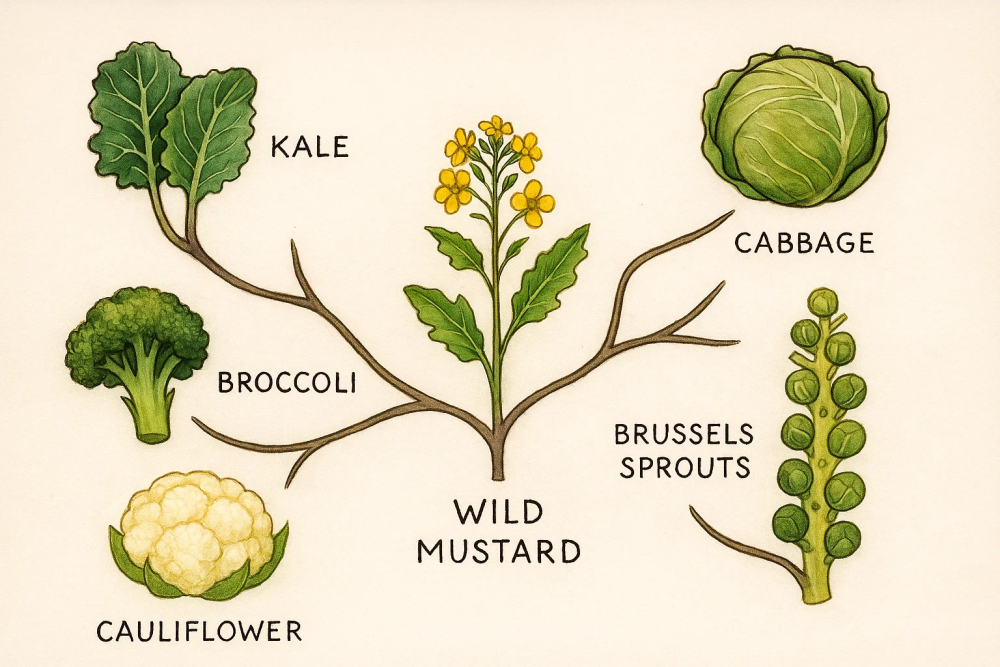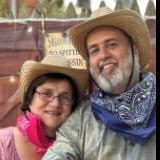From Wild Mustard to Superfoods: How One Plant Gave Rise to Kale, Broccoli, and More —a Glimpse of Wonder entry™—
In a fascinating story of agricultural ingenuity, some of the world’s most beloved vegetables—kale, broccoli, cauliflower, cabbage, and Brussels sprouts—all share a surprising origin: the wild mustard plant, Brassica oleracea. Through centuries of selective breeding, ancient farmers transformed this single species into a family of diverse and nutritious crops.
The Science of Selective Breeding
Selective breeding, the process of choosing and propagating plants with desirable traits, allowed early farmers to emphasize specific features of wild mustard. The wild mustard plant, native to coastal regions of southern and western Europe, exhibits remarkable phenotypic plasticity—the ability of a single species to develop significant physical differences based on selective pressures or environmental conditions. This plasticity enabled the creation of vegetables with unique forms and uses. Here’s how selective breeding shaped each vegetable:
• Kale: Bred for its large, hearty leaves, ideal for salads and cooking.
• Cabbage: Developed from plants with tightly packed, overlapping leaves, creating dense, compact heads.
• Brussels Sprouts: Evolved by selecting plants with miniature buds growing along the stem.
• Broccoli: Resulted from emphasizing larger, clustered flower buds.
• Cauliflower: Created by focusing on undeveloped flower heads that form tight, white curds.
The Impact of Human Ingenuity
“This is a textbook example of how selective breeding can create an extraordinary variety of crops from a single plant species,” explains Dr. Kenneth M. Olsen. “By focusing on specific traits, farmers transformed a single species into vegetables that fulfill very different purposes in our diets.”
These specialized crops meet diverse dietary and cultural needs. Kale is celebrated as a nutrient-dense superfood, cabbage stores well for long periods, and broccoli and cauliflower are packed with antioxidants and vitamins. Meanwhile, Brussels sprouts have become a staple side dish for millions worldwide.
A Call for Biodiversity
 This history underscores the importance of preserving the wild relatives of cultivated crops. While human intervention has enhanced Brassica oleracea, its wild ancestor still holds genetic traits that may be critical for future agricultural challenges, such as adapting to pests, diseases, or climate change.
This history underscores the importance of preserving the wild relatives of cultivated crops. While human intervention has enhanced Brassica oleracea, its wild ancestor still holds genetic traits that may be critical for future agricultural challenges, such as adapting to pests, diseases, or climate change.
“Crop wild relatives are an essential resource for improving resilience in modern agriculture,” Dr. Olsen emphasizes. “They contain genetic diversity that we may need to combat emerging challenges in food production.”
A Legacy of Innovation
Today, kale, broccoli, and their cousins are celebrated as superfoods, renowned for their health benefits and versatility. Yet, their journey from a scraggly wild plant to essential components of modern diets highlights humanity’s profound ability to shape and refine nature.
Edited by dljbsp




1 Comment
Recommended Comments
Join the conversation with your brothers and sisters!
You are posting as a guest. If you are already a member, sign in now to post with your existing account.
Note: Your post will require moderator approval before it will be visible.